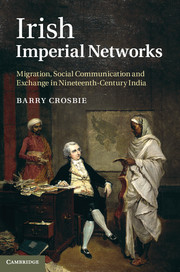Book contents
- Frontmatter
- Contents
- Preface
- Acknowledgements
- Abbreviations
- 1 Introduction
- 2 The business of empire
- 3 British overseas expansion, Ireland and the sinews of colonial power
- 4 From trade to dominion
- 5 Religion, civil society and imperial authority
- 6 From Company to Crown rule
- 7 Imperial crisis and the age of reform
- 8 Conclusion
- Glossary
- Bibliography
- Index
7 - Imperial crisis and the age of reform
Published online by Cambridge University Press: 05 December 2011
- Frontmatter
- Contents
- Preface
- Acknowledgements
- Abbreviations
- 1 Introduction
- 2 The business of empire
- 3 British overseas expansion, Ireland and the sinews of colonial power
- 4 From trade to dominion
- 5 Religion, civil society and imperial authority
- 6 From Company to Crown rule
- 7 Imperial crisis and the age of reform
- 8 Conclusion
- Glossary
- Bibliography
- Index
Summary
Introduction
The historiographies of Ireland and India have long recognised parallels between the countries’ shared imperial pasts and their struggle for political freedom and national self-determination. As a consequence, scholars have been able to make significant progress in situating this nexus by exploring links between contemporary Irish and Indian elites and how Irish precedents influenced British policy-making in India and vice versa. While scholars have begun to explore the mutual calls for national self-determination and political freedom articulated by contemporary Irish and Indian elites, fewer studies have focused upon the complex social and cultural networks that bound both dependencies together and through which their development was shaped. In part, the paucity of studies in this area reflects much of the wider contemporary writing on Ireland and empire itself. For the most part, debates surrounding the nature of Ireland’s historical relationship with the Empire have remained largely centred upon the character of its constitutional and political ties with Britain.
This chapter examines how during the late nineteenth century increased economic decline both in the agricultural south and west of Ireland (though not in the north, where Ulster experienced rapid economic growth during the same period) and in India provided the impetus for a new generation of nationalists, philanthropists and humanitarians to move their ideologies beyond local predicaments and into the wider international domain. The rigorous imposition of free trade (from 1801 in Ireland and from 1834 in India) brought about a sharp decline in the demand for Irish and Indian commodities in British and European markets and with it increasing calls from early economic nationalists for the introduction of protective measures for home produce in both countries. Within this context, this chapter examines how an elaborate web of contact, dialogue and exchange was fashioned between the nationalist spokesmen of nineteenth-century Ireland and India who, from the 1870s, gradually became aware of each other’s calls for economic reform and national self-determination. Related to these concerns were the comparable moral and political issues raised in both countries at the time over the ownership of land and the administration of famine relief, both of which were used by these networks as tools in imperial politicking. Crucially, it was the position of certain Irish individuals within the power structures of the Empire itself and particularly within the echelons of the Indian Civil Service (ICS) that provided much of the initial impetus for these ideologies to spread and gather momentum.
- Type
- Chapter
- Information
- Irish Imperial NetworksMigration, Social Communication and Exchange in Nineteenth-Century India, pp. 205 - 252Publisher: Cambridge University PressPrint publication year: 2011



